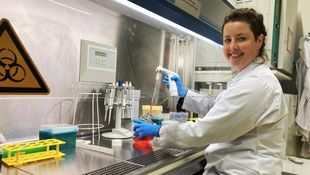Our lungs are a marvel, but they have a "weak spot", so to speak, because we can't stop breathing! If the air we breathe in is contaminated with pollutants, these fine substances inevitably end up deep in our lungs. Epidemiology now knows that dust particles or nitrogen oxides trigger inflammation in the lungs and subsequently diseases such as COPD, lung cancer or asthma. But how exactly? What mechanisms take place deep in the lung cells? And how can we research these mechanisms?
A new Emmy Noether junior research group led LHI scientist Dr. Carola Voss ("OrganoidTox: Modeling airborne toxin-induced perturbations in cell circuits and their effect on respiratory health") aims to answer these questions from 2024. (The German Research Foundation (DFG) is funding the group with 1.7 million euros.)
Carola Voss is project leader for lung organoids at the Institute of Lung Health and Immunity (LHI, Helmholtz Munich) and at the CPC-M, the Munich site of the German Center for Lung Research (DZL). In the newly formed junior research group, she will focus on the molecular relationships (Mode of Actions, MoAs) of air pollutants in the lungs. She will be working with human lung organoids - 3D micro-tissue models that replicate the properties of the deep airways. They are derived from pluripotent stem cells and are therefore an unlimited and ethically acceptable way of conducting research in the human model. Carola Voss' aim is to identify disease-relevant signatures based on exposure to air pollutants. She then wants to correlate these biomarkers with genetic predisposition, biological sex and epigenetic regulation.
After LHI PI Mareike Lehmann, Carola Voss is the second scientist within a year at the LHI/CPC-M to be awarded and lead an Emmy Noether junior research group. Congratulations to both young researchers!
About the DFG and its focus on toxicology:
The German Research Foundation (DFG) advises parliaments as well as institutions working in the public interest with regard to, among other things, assessing the health risk of substances and substance compounds. As part of its strategic funding initiative "Toxicology", the German Research Foundation (DFG) is focusing on strengthening scientists in the early career phase in this field. The aim is to offer the next generation of highly qualified scientists in toxicological research an attractive career opportunity in science and to promote and structurally strengthen toxicological research in Germany.
The Emmy Noether Program gives outstandingly qualified young scientists the opportunity to qualify for a university professorship by independently leading a junior research group over a period of six years. The funds are initially approved for three years and are promised for a further three years.


